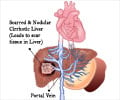After more than 20 years of research, researchers at the Experimental and Clinical Research Center (ECRC) have now identified the gene that causes hereditary hypertension and at the same time a skeletal malformation called brachydactyly type E, which is characterized by unusually short fingers and toes. This rare syndrome which affects blood pressure so seriously that if left untreated, it most often leads to death before 50-years of age.
In six families not related to each other the scientists discovered different point mutations in the gene encoding phosphodiesterase-3A (PDE3A). They found that these mutations always lead to high blood pressure and shortened bones of the extremities, particularly the metacarpal and metatarsal bones.
This syndrome is the first Mendelian hypertension form (salt-resistant) not based on salt re-absorption but instead is more directly related to resistance in small blood vessels. The researchers point out that hypertension in the families that they examined is not linked to dietary salt intake. The consensus of researchers so far has been that too much salt in the diet damages the kidneys and increases the blood pressure.
Senior author Sylvia Bahring said, "We have shown in the study that for the development of the inheritable form of hypertension only the blood vessels are of significance and not directly the kidneys."
The study is published online in
Nature Genetics.Source-Medindia





![Pulmonary Arterial Hypertension [PAH] - Symptoms & Signs - Causes - Diagnosis - Treatment Pulmonary Arterial Hypertension [PAH] - Symptoms & Signs - Causes - Diagnosis - Treatment](https://www.medindia.net/images/common/patientinfo/120_100/pulmonary-arterial-hypertension-pah.jpg)









